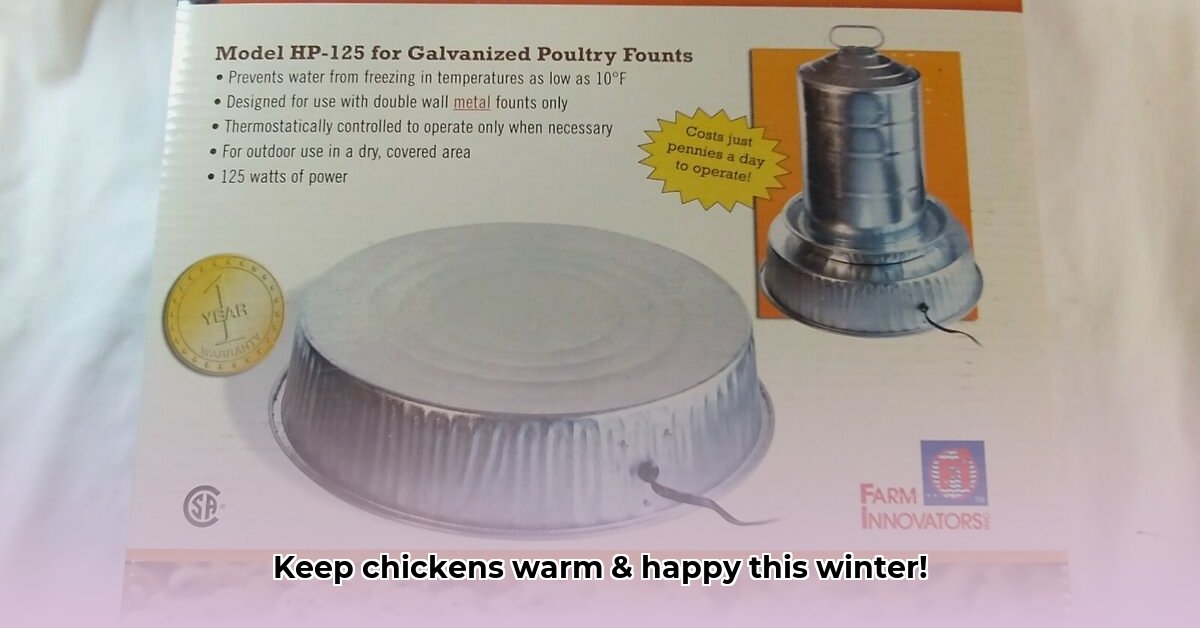
Winter's harsh conditions can threaten your flock's access to fresh water. Frozen water leads to dehydration, impacting your chickens' health and productivity. A heated chicken waterer from Tractor Supply offers a reliable solution, ensuring your birds stay hydrated all year round. For more options, check out other animal supplies. This guide provides a comprehensive overview, helping you select, install, and maintain the perfect heated waterer for your needs.
Sizing Up Your Needs: Chickens, Climate, and Budget
Before you browse Tractor Supply's selection, consider these crucial factors:
- Flock Size: Larger flocks require waterers with greater capacity. A small flock might thrive with a smaller, more affordable model.
- Climate: Extremely cold climates demand higher-wattage heating elements to prevent freezing. Check the local climate's lowest temperatures for appropriate selection.
- Budget: Heated waterers vary in price. Set a realistic budget before shopping to avoid overspending.
- Electricity Access: Reliable electricity is essential for heated waterers. Assess power availability at your coop location.
Choosing the Right Heated Chicken Waterer: Key Features
Tractor Supply offers various models, each with unique features. Prioritize these key aspects:
- Capacity (Gallons): Choose a capacity that comfortably supports your flock's daily water consumption. Consider adding extra capacity for particularly cold days and periods of higher demand.
- Heating Element (Wattage): Higher wattage offers more robust heating power, crucial for extremely cold environments. Look for energy-efficient options to reduce running costs.
- Durability and Materials: Select a waterer made from durable, impact-resistant materials (e.g., heavy-duty plastic or stainless steel). This ensures longevity and resistance to damage from pecking or harsh weather.
- Cleaning Ease: Opt for a design that easily disassembles for convenient and thorough cleaning, reducing the risk of bacterial contamination.
- Safety Features: Prioritize safety features like automatic shutoff to prevent overheating and potential hazards.
Installation and Maintenance: A Step-by-Step Guide
Installing your heated waterer is typically straightforward (follow the manufacturer's instructions carefully!). Regular maintenance is critical:
- Daily Cleaning: Clean the waterer daily to remove debris and prevent build-up. This simple step significantly reduces the risk of bacterial contamination and maintains optimal water quality.
- Heating Element Inspection: Inspect the heating element regularly for damage. Replace it immediately if any cracks or wear are evident. A damaged heating element reduces efficiency and poses a potential fire risk.
- Cord and Plug Check: Regularly check for signs of wear, fraying, or damage on the power cord and plug. Replace a damaged cord to prevent electrical hazards.
- Stability Check: Ensure the waterer is securely positioned and won't easily tip over. This prevents spills and potential damage.
Heated vs. Unheated: Weighing the Pros and Cons
Deciding between a heated and unheated waterer depends on your specific needs and climate. Here's a comparison:
| Feature | Heated Waterer | Unheated Waterer |
|---|---|---|
| Pros | Prevents freezing; consistent water access. | Typically less expensive; simpler design. |
| Cons | Higher initial cost; requires electricity; potential for malfunction. | Requires frequent refilling; susceptible to freezing. |
Beyond the Basics: Long-Term Considerations
Investing in a quality heated chicken waterer from Tractor Supply is a long-term investment in your flock’s health and well-being. Selecting a durable, energy-efficient model minimizes long-term expenses, ensures consistent hydration for your chickens, and simplifies your farm management. Dr. Emily Carter, Poultry Science Professor at Ohio State University, notes, "Providing consistent access to fresh water is paramount for chicken health and productivity. Investing in a suitable heated waterer significantly improves bird welfare and reduces the overall workload for the farmer." This translates into potentially increased egg production and healthier birds, rewarding your investment many times over. A happy flock is a productive flock!
Frequently Asked Questions (FAQ)
Q: How often should I replace the water in my heated chicken waterer? A: While the heater prevents freezing, it's still important to replace the water daily to maintain cleanliness and prevent bacterial growth.
Q: What happens if the power goes out? A: The water will eventually freeze. Consider having a backup plan, like a secondary, non-heated waterer for emergencies.
Q: Can I use a heated waterer year-round? A: Yes, although the heating element will only be necessary during cold weather.
This comprehensive guide empowers you to make an informed decision, ensuring your flock enjoys optimal hydration and health, no matter the weather. Remember to always consult the manufacturer’s instructions for your specific waterer model.